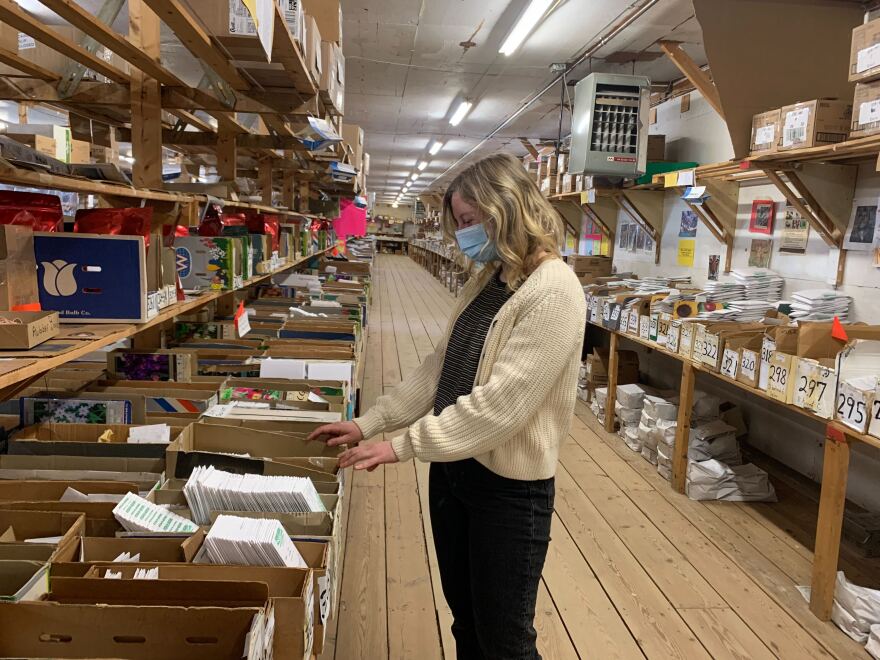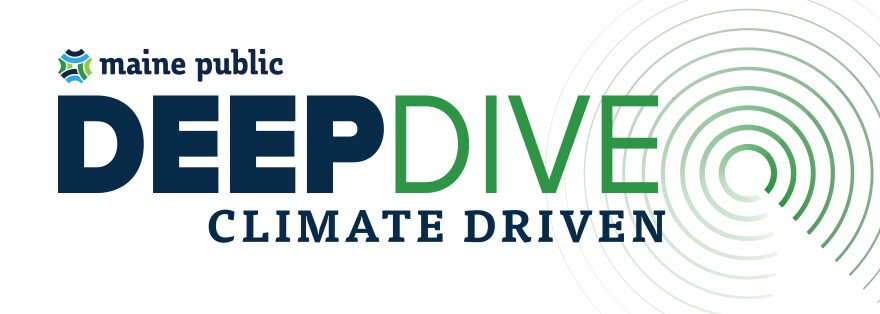This story is part of our series "Climate Driven: A deep dive into Maine's response, one county at a time."
The ground is starting to thaw on a gray Saturday afternoon in late March, which means it’s almost time for Albie Barden to prepare his fields for corn.
Barden usually plants two or three varieties of corn at his Norridgewock home every year. When growing season is over and the corn is harvested, he chooses one variety to hang and dry from a rope in his kitchen.
This year, it’s the Abenaki rose, the first variety Barden began saving a little more than 10 years ago. He got this particular seed from a man of Native ancestry, Barden said.
"He said it used to be grown in Maine and then it moved to New York. And my relatives brought some of it back and this is some of that," Barden recalled. "And I said, 'Is it possible that I could get some of this seed? Do you know where I could get some of it?' He said, 'Of course,' and he took the ear and he peeled off 12 kernels."
Those 12 kernels eventually grew into 23 ears of corn in Barden’s yard. He grew more the next year. And more after that.
"You can save the very best of the best for your next seed crop, and so it’s not like you’ve lost it by only starting with 12 seeds," Barden said. "You have this fine thread of something that was almost lost and you’re bringing it back."
That’s what Barden does each year, using some seeds to plant his crop for the next season and often giving some to other gardeners and farmers.
For Barden, seed saving is a way to connect with the past and the traditions and cultures of the people who cultivated the land before him, including his own family, who has a long history of growing corn.
But many seed savers see the practice as a future imperative as the global food system becomes more vulnerable to climate change.
Heron Breen, a seed saver from St. Albans, has restored a few varieties of his own, including a squash known as a Vermont Hubbard, which he found in a German seed repository. He managed to bring about 25 seeds to the U.S. from Germany, and he's grown the squash three times.
"Now folks in Vermont are also growing it, and some other folks are growing it," said Breen, who also teaches seed saving classes and co-founded an organic seed conference in the Northeast. "I've listed it with places where seed collectors or seed growers are interested, and I've shared it with other folks. At this point it's no longer extinct in the United States."

Sharing seeds with other gardeners and farmers allows them to grow out those varieties and continue the cycle. Sometimes they’re sold or given to seed exchanges and catalogs like Fedco, a worker-member cooperative based in Maine where Breen used to work for many years.
Local growers come to Fedco’s warehouses in Clinton to pick up their seeds. Others are sold online or through its catalog and packed into small envelopes or boxes and mailed.
Fedco offers more than 1,000 seed varieties, some of which it buys from other companies in bulk. But it also contracts with farmers and gardeners in Maine, the Northeast and around the country.
"They grow out a seed crop like anyone would in their garden or farm," said Emily Pence, the field coordinator at Fedco Seeds. "If you want seed of a butternut squash, you grow out that butternut squash until it’s ripe, and then you harvest and dry the seeds. And the growers send them back to Fedco."
The cooperative keeps tabs on how farmers are doing with hundreds of varieties each year. They're usually looking for varieties that can be grown locally or in the Northeast — and that are well-adapted to Maine’s climate and short growing season.
"These varieties in the past, vegetables, were being bred and selected by farmers and gardeners and the indigenous community to be totally up front, in the regions where they lived," Breen said. "There's an amazing adaption to specific climates or specific stresses."
Most seed that's grown into the world's food supply, however, isn't produced locally today; it's grown hundreds of miles away from where it's eventually purchased or consumed. Just a handful of large corporations own the seeds that are grown into the global food supply, and a 2019 United Nations study found just nine plant species are responsible for two-thirds of the world's crop production.

That poses a big risk in the face of climate change, Pence said.
"There’s been a really alarming consolidation of varieties and extinction of varieties, which of course leads to lack of diversity and makes the plants that we rely on for our food really vulnerable," Pence said.
Some heirloom seeds have become resistant to drought or some diseases over time.
On one hand, those could be priceless attributes for gardeners and farmers looking for crops that can withstand a changing climate, if the seeds are preserved and grown locally as the original stewards intended, Breen said.
But the environment is changing so quickly, those even those resilient traits may not be enough.
And as varieties are lost over time to climate change and modern agricultural practices, Breen said there’s another challenge in the ongoing effort to preserve them.
"There’s actually too many varieties and too few skilled hands — women, men — to bring these out into the world," he said.
Breen said many knowledgeable seed savers have passed away, and historically, there haven’t been as many young people interested in taking on the work. He’s hopeful, though, that’s beginning to change.
The future of our food in the face of climate change, he said, depends on it.




